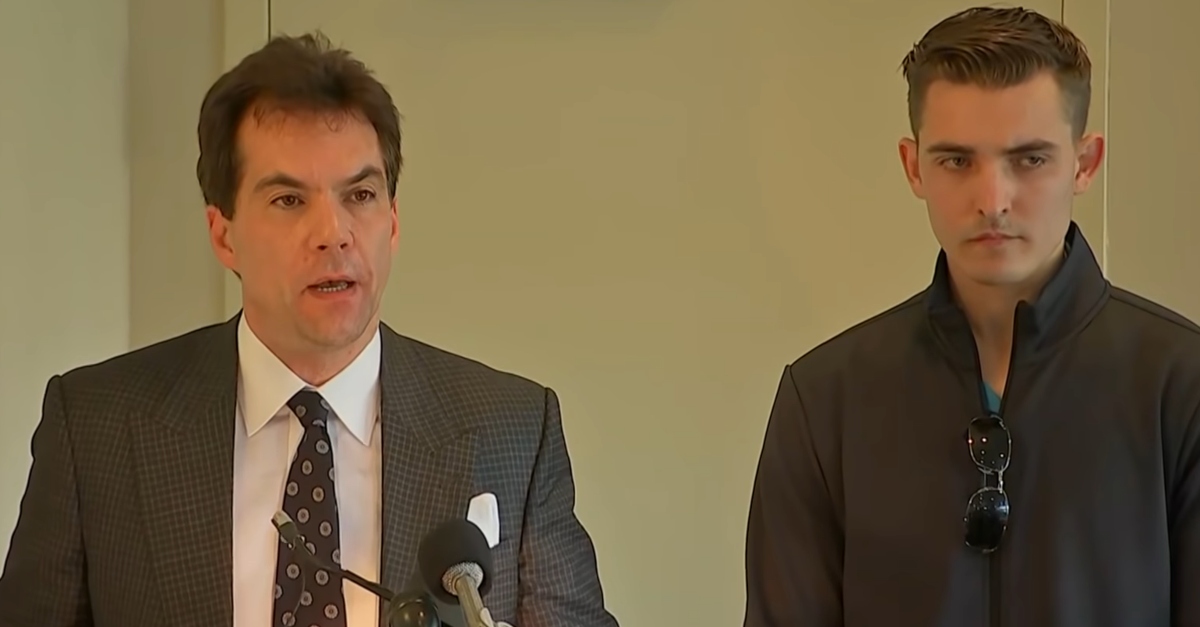
Jack Burkman and Jacob Wohl
The company behind robocalls by conservative hoaxers Jacob Wohl and Jack Burkman cannot dismiss a lawsuit accusing them of facilitating messages amounting to illegal voter suppression, a federal judge ruled on Friday.
Wohl and Burkman have been facing criminal prosecution and civil litigation from the fallout of robocalls, which allegedly tried to discourage Black and other minority communities from voting by mail with false stories about the supposed consequences of not voting in person.
Joining a civil rights lawsuit accusing the duo of violating the Ku Klux Klan Act, New York Attorney General Letitia James (D) hopes to stick them with a $2.75 million fine, broken down into a $500 penalty for each of the 5,500 New Yorkers subjected to the calls. She also sued Message Communications, the telecom provider that disseminated the messages, and its CEO Robert Mahanian.
In an effort to dismiss the lawsuit, the telecom and Mahanian argued that they were merely the medium, not the message. They also argued that Section 230 of the Communications Decency Act—a law described by its supporters as the backbone of free speech on the internet—immunized them from liability.
On Friday, U.S. District Judge Victor Marrero rejected those arguments, claiming that the attorney general sufficiently alleged that Mahanian “knew of the content or purpose of the robocalls.”
As evidence for this proposition, Judge Marrero cited Burkman’s August 2020 email to Mahanian: “Check to you Robert just went out in the 2 day pouch you will have in 2-3 days then we attack.”
“The use of ‘we attack’ in this email between Burkman and Mahanian reinforces the notion that Mahanian was aware of the robocalls’ disruptive purpose and intimidating nature,” the order states.
Judge Marrero found that the Mahanian and his company’s alleged failures of due diligence were two-fold: They failed to verify the accuracy of the robocalls or scrutinize whether the messages were illegal.
“In other words, the message’s contents and their legal effect are distinct concepts; knowledge of one does not require knowledge of the other,” the judge wrote. “For this reason, the allegation that Mahanian and Message failed to conduct any due diligence does not undermine the allegations that they knew what the robocall message contained or its intended purpose.”
Judge Marrero also set aside Message Communication’s defense that the company was entitled to immunity under Section 230 of the Communications Decency Act, which shields any “interactive computer service” from liability for third party actions.
For the judge, it was not clear Message Communications was the type of company the statute was designed to protect.
“It is apparent that users, such as Burkman and Wohl in this case, can upload audio files to Message’s website, which are then transmitted via robocalls. But it is not apparent from this fact alone whether Message satisfies the definition of a provider or user of an interactive computer service,” the ruling states. “As the NY AG argues, there remain outstanding factual questions that must be resolved before the Court can make such an assessment.”
Definitions of that phrase aside, however, the judge found there was another reason Message Communications was not entitled to such immunity.
“Even assuming that Message is a provider or user of an interactive computer service, however, the Court is persuaded that the NY AG has sufficiently alleged that the Message Defendants acted as more than a passive publisher or neutral intermediary in the circumstances of this case,” Judge Marrero wrote.
Former President Donald Trump and other top Republicans have attacked Section 230 immunity, often misleadingly, in their war against social media companies. They have blamed the law for allowing Twitter to ban Trump from its platform; in fact, legal observers note the law actually shielded the social media company from getting sued for Trump’s misinformation, likely delaying their action to ban him in the first place.
An attorney for the company and the CEO did not immediately respond to an email requesting comment. Neither did a spokesman for the attorney general.
Read the ruling below:
(Screenshot via NBC)